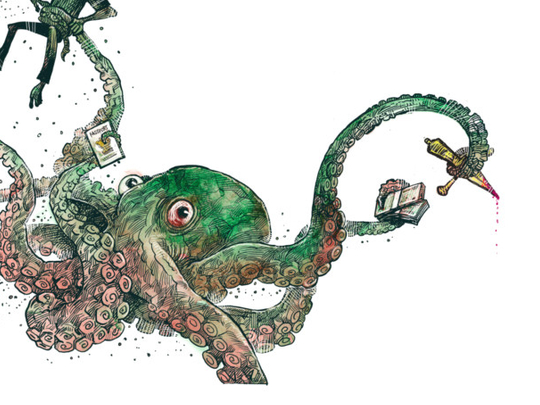
Dubai: Rajnath, a shop worker in Ajman, always dreamt big. He earned less than Dh2,000 a month. But that did not stop him from buying the shop when the owner put it up for sale. It meant borrowing Dh12,000 from a private moneylender, yet Rajnath took the plunge. After all, he had managed an earlier loan from the same source without difficulty.
“I had borrowed Dh5,000 from him earlier and had cleared the loan in two years by paying a monthly interest of Dh500. So I approached him again and borrowed the money for the shop,” he said.
But things went horribly wrong this time.
Unable to make ends meet, Rajnath could not pay the instalments. As his dream turned into a nightmare, he attempted suicide by hanging himself. He was saved in the nick of time, but what followed was a a living hell. He was constantly hounded by the moneylender, who even threatened to target his family in India to recover the money. Friends eventually pitched in to repay his loan.
But not everyone is as lucky.
An XPRESS investigation revealed that residents hard-pressed for cash often turn to private money-lenders only to be caught between the devil and the deep sea. From tailoring shops, cafeterias and carpentry shops to maintenance companies, hotels and informal financial services, a well-oiled network of private money-lenders is running a parallel banking industry, providing millions of dirhams in loans.
Their clients — referred through word-of-mouth — include everyone from petty labourers to respectable middle class families. Very few can afford to pay the interest rates that can go up to a whopping 120 per cent per year. But the money lenders are not worried because they have ways to recover their money — a trait that has earned them the sobriquet of “blade mafia”.
It’s a murky world
Last Monday, two woman gave a shocking insight into the murky world of the blade mafia when they told a Dubai Court how they were kidnapped by a Chinese woman from International City and driven to an empty building in Abu Dhabi where they were threatened with death if they did not return the Dh250,000 they had borrowed from her.
There is no getting away for the borrowers.
Pushed to the wall last May, a prominent Indian social worker found his escape route by killing himself. Ironically, he had been helping debt-ridden families and counselling them against suicide.
In an unwritten rule, money-lenders withhold passports of borrowers alongside guarantee cheques.
Last October a Filipina entrepreneur was found dead in her car trunk after being savagely knifed by a man she knew for over 20 years. He owed her Dh250,000 and she had withheld his passport.
Our investigation led us to Gina, another Filipina, who lends to small businesses and then eventually takes them over. The practice is a hybrid of what is commonly known as “five-six”, literally lending five and collecting six (or 20 per cent) per month — or 120 per cent a year.
Usurious lenders also charge a daily interest if the amount due is not paid on time. When Maria borrowed Dh400,000 from her fellow countrywoman Zeny in 2010 to help her ailing retail business, Zeny took both a guarantee cheque and Maria’s passport. She charged her Dh40,000 in monthly interest.
“I needed the money,” said Maria, 41, who had an annual turnaround of over Dh3 million. “I knew more than 10 people who used to lend on a ‘five-six’ basis. You get easy access to cash, but they make your life hell. Initially, I went to a bank but they turned me away as banks don’t deal with small businesses with no track record. Nor do they entertain individuals without creditworthiness.”
“My lender,” said Maria, “asked me to sign an undertaking five months later stating that I owed her Dh1 million, but in reality I took only Dh400,000. I had a buyer who offered Dh1 million for my business. We signed a memorandum of agreement. But Zeny wanted my business too. She filed a bounced-cheque case against me and took over my stocks worth Dh350,000.”
After spending four months in jail, Maria is still trying to rebuild her life as a salaried employee. “Once bitten twice shy, I keep away from loan sharks now.”
But there is no dearth of loan seekers. Ask Abu Dhabi-based Shabu. The cafeteria owner who is part of a moneylending chain said he has a stream of people wanting to borrow anything from Dh1,000 to Dh500,000. “We started with a capital of Dh500,000. There are seven of us and we all pitched in some money. Within a few months our initial investment doubled to Dh1 million. Today we have around Dh5 million in circulation across the UAE,” he said.
Checks and Balances
According to insiders, the cash flow in the high-stakes business is sustained by residents who offer their savings to money-lenders on the promise of huge returns. After circulating the money in the market at high interest rates, the investors get their money multiplied.
“For them it is quick money. We pay them better interest than banks. If the lending period is up to one year, we pay over 10 per cent,” said Shabu, who is quick to add that the risks are huge. “There are many fly-by-night debtors in the UAE. We have to keep a close watch on them or they will abscond after a few months and we stand to lose.”
Others in the business say they have checks and balances in place to ensure that people don’t default on interest payments.
Most lenders collect up to three months’ interest even before they part with the loan. Subsequent recoveries have their own standard operating procedures.
“We call borrowers two days before the due date. Interest is collected on an agreed time and date every month. If they default on interest, an extra two per cent is added,” said Usman, a moneylender who operates from Sharjah.
He said loans are offered only on referrals. “In our business, we do not deal with complete strangers. Somebody in our chain or an existing or past client has to introduce a newcomer.”
On their part, the moneylenders gather all possible information about the borrower which is where many potential defaulters get trapped. “We need to know all his details, including telephone numbers and address back home. We also get details of a close relative or friend who is a guarantor,” Usman said.
“If someone defaults, we will try to retrieve the amount here itself. But in some cases we are forced to approach their families back home. Most debtors have properties or other assets in their home country. We force debtors to sell them off and settle the dues,” said Usman.
The ploy of threatening the family adds to the debtor’s woes as it did with Rajnath. “My family was not aware of my debt. I had not travelled back home for years as my passport was with the money-lender.”
Hitendra, another Indian who got sucked in the moneylending trap said: “The loan sharks know how to get their money back. Initially, they threatened me daily. They’d send different people who would pose as friendly visitors. On their way back, they would drop a hint saying they would ‘present my cheque’, which meant only one thing: that I land in jail.”
He had approached the moneylender to repay a Dh50,000 bank loan but ended up with a debt of Dh600,000 in less than four years.
Alarmed by the rise in suicides by Indians over financial problems, 15 welfare associations started a campaign last year. They offer legal and psychological support and advise them on how to guard against illegal lenders.
NGOs said desperate victims regularly approach them for help.
C.P. Mathew, founder of Valley of Love, said he has come across cases where entire families have pledged their passports to borrow money. “Sometime back we helped a cancer patient get his passport back from the money-lender and return to India. He had borrowed Dh10,000 from a money-lender and was yet to return the principal amount although he had paid Dh60,000 in interest,” he said.
“Intervention of NGOs forces many loan sharks to return passports,” said Mathew, adding that many small-scale businesses are doubling up as money-lenders. “It is better that people look towards their home countries to solve their financial problems.”
The head of another NGO said: “There’s no escaping these loan sharks once you go to them. We come across eight to 10 such cases every month. But desperation forces people to turn to private money-lenders and that is what they thrive on.”
Reporting by Sharmila Dhal, Jay B. Hilotin, Anjana Sankar and Shweta Pathak, XPRESS











